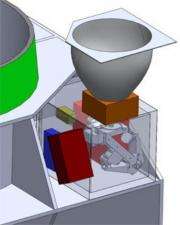Caltech and Canadian Space Agency awarded NASA project to develop spectrometer headed for Mars

The California Institute of Technology (Caltech) and the Canadian Space Agency (CSA) announced today that they will be partnering on the development of the Mars Atmospheric Trace Molecule Occultation Spectrometer (MATMOS) instrument to be flown aboard the ExoMars Trace Gas Orbiter when it launches in 2016.
The project will be funded by a grant from NASA, with additional support coming from the CSA.
NASA participation in the ExoMars Trace Gas Orbiter is managed by the Jet Propulsion Laboratory, a division of Caltech, in partnership with the European Space Agency.
"The ExoMars investigation is designed to study the composition of Mars's atmosphere, with a focus on biogenically or volcanically derived trace gases," says Paul Wennberg, the R. Stanton Avery Professor of Atmospheric Chemistry and Environmental Science and Engineering at Caltech and director of the Ronald and Maxine Linde Center for Global Environmental Science. Wennberg is the principal investigator on the MATMOS team.
The ExoMars Orbiter's circular path around Mars will point the MATMOS telescope at the center of the sun as the spacecraft goes into orbital sunrise and sunset. During these periods, as the sun sets and rises through the atmosphere, MATMOS will take spectra of the sunlight, recording the absorption of numerous gases. The sun's long path length through the Martian atmosphere will allow MATMOS to measure the trace gases with very high sensitivity, notes Wennberg.
"If you take the spectra fast," says Geoffrey Toon, senior research scientist at JPL and a visiting associate in planetary sciences at Caltech, "you can measure the gas abundance at many different heights above the planet —70 measurements as the sun rises, and 70 as it sets."
Among the gases of interest to the team are those "diagnostic of active geological and biogenic activity," says Wennberg—gases like methane, as well as carbon, sulfur, and nitrogen-containing molecules, sulfur dioxide, and hydrogen sulfide.
MATMOS will be so exquisitely sensitive, says Wennberg, that it will be able to measure the concentrations of these gases down to parts per trillion.
"We did a calculation which shows that the microbial community found in three cows' bellies would produce an amount of methane that, in the Mars atmosphere, would be observable by MATMOS," says Mark Allen, principal scientist at JPL and a visiting associate in planetary sciences at Caltech.
MATMOS is based on the Atmospheric Trace Molecule Spectroscopy (ATMOS) experiment, developed by JPL, and the Atmospheric Chemistry Experiment-Fourier Transform Spectrometer (ACE-FTS), pioneered by University of Waterloo and the Canadian Space Agency. The ATMOS instrument has flown four times on the Space Shuttle since 1985. ACE-FTS was launched in 2003 and is still operational.
"MATMOS is an excellent instrument and an opportunity for a great partnership," says CSA Senior Planetary Scientist Victoria Hipkin, co-principal investigator on the MATMOS project. "We have taken the optical systems of one of Canada's flagship satellite instruments (Scisat ACE-FTS) and combined it with state-of-the-art data processing from the US (JPL's ATMOS and MrkIV). Our team—with US and Canadian leadership and Canadian, US, French, and UK members—is looking forward to providing fundamental data about this fascinating planet."
Provided by California Institute of Technology